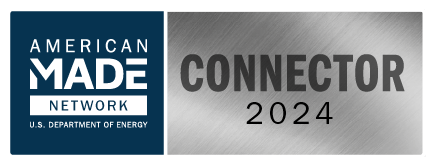By Orla McCaffrey
The manufacturing of lithium-ion batteries will be coming to the Southern Tier a bit earlier than expected, thanks to a quick-thinking purchase by a company in the Binghamton Start-Up Suite incubator.
Imperium3, the battery development consortium that prompted Gov. Andrew Cuomo to visit the region last fall, recently closed a deal for industrial manufacturing machinery from a shuttered North Carolina factory.
The consortium focuses on the research, development and manufacturing of lithium-ion batteries, which can provide more power than traditional batteries because of an improved chemical composition. Imperium3 is owned by a consortium that includes Charge CCCV (C4V), founded by former postdoctoral researcher Shailesh Upreti on the Binghamton University campus in 2014.
C4V was an early entrant into the Binghamton Start-Up NY program at the Start-Up Suite incubator and is also a member of the Southern Tier Clean Energy Incubator (SCI), part of the Binghamton Incubator Program (BiP), which operates the Start-Up Suites and the Koffman Incubator.
There are numerous applications of the improved batteries, according to Upreti.
“Once our chemistry is adopted and we integrate that in the battery, the battery has many different types of advantages,” Upreti said in a recent interview. “We can fine-tune the properties of the molecules and get you, let’s say, a higher-power battery for an iPhone.”
Imperium3 had initially planned to build a factory at Endicott’s Huron campus by the end of 2019, bringing more than 200 jobs to the area. That date has now been moved up, after the consortium snagged $200 million of machinery and assets in a bankruptcy auction. The price? Just $5 million. That means the $140 million investment cost Imperium3 had estimated will likely be much lower.
Imperium3 and C4V, the company that owns the intellectual property of the new technology, continue to utilize space on the Binghamton campus, specifically the Start-Up Suites located at the Innovation Technologies Complex (ITC). Upreti said the facilities have been helpful to the business in its early stages and as it continues to grow.
“That’s a multi-million dollar facility which companies like us cannot afford to have in-house,” he said. “It’s very, very helpful to us because it allows us to solve problems very fast, so if we run into a situation where we have to diagnose, we have the tool.”
Cuomo spoke at the proposed factory site last October, praising the transition from university research to commercialization and the potential for hundreds of local jobs.
“[Charge CCCV], with this great invention, is now ready to go to the next step, which is to create a factory to actually make these batteries and produce these batteries,” Cuomo said during his visit. “Where are they going to do it? Right here in Endicott.”
Upreti said the deal was appealing because most of the machinery was never used in production.
“It was developed in 2016, so we knew it could serve the purposes we need,” he said.
Those purposes include product formation and testing, cell assembly and module assembly and packing. Imperium3 has already secured contracts with providers in India and Africa, who want to use the batteries to power rail cars and off-grid electrical systems.
The decision to base the factory in the Southern Tier, Upreti said, was both an emotional and business-oriented one.
“IBM, Kodak…these multi-billion dollar entities were developed here,” Upreti said. “If that exists here — the background and foundation of industry — if you connect our emotions to that background, I think it made perfect sense to do it here.”
Last summer, C4V won $500,000 in 76 West’s Clean Energy Competition, a state-operated program that rewards companies promising to bring clean energy services and jobs specifically to the Southern Tier region.
Imperium3 is now in the process of hiring contractors to move the machinery more than 600 miles its Concord, North Carolina factory. Once that’s done, Endicott’s first lithium-ion factory will be finished in three to five months.



